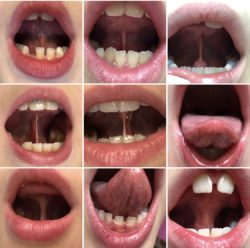Language is your friend
Dentysta stomatolog Warszawa Ursynów ADENTIS / Services / Language is your friend
 |
Language Your Friend. Why have enemies when you can have friends. Make friends with your language, help it be your friend.< /p> |

- Infantile swallowing is the way of swallowing saliva with the tongue flat on the floor of the mouth. Infantile swallowing should develop into mature swallowing by the age of 3-4.
- Adult type of swallowing – the tip of the tongue rests on the gingival fold behind the upper teeth, and thus makes vertical movements, the jaws are tight and the lips are closed without unnecessary effort.
- eating mushy meals
- nasal obstruction
- habitual mouth breathing
- hypertrophy of the third tonsil
- short sublingual frenulum
- drinking from a sippy cup
- thumb sucking
- long-term pacifier sucking
- low tongue muscle tone
- incorrect body position
TOP TOPIC
A new fashion or conscious exploration of a topic.
Muscles – tongue – hyoid bone – TMD – worn teeth – tinnitus – headache.
A visit to an otolaryngologist – without any abnormalities in the ears that could cause noise and pain.
Visit to a neurologist – no abnormalities that could cause pain.
Often such a patient also visits a psychologist – when pain clouds your world.
The last link is the DENTIST, the patient comes to this doctor on his own, tired of the oppressive pain.
The symptoms of temporomandibular joint are so non-specific that the source of the pain cannot be clearly defined.
PAIN is not a measurable diagnostic factor. WHEN AFTER therapy and treatment of temporomandibular joints, the patient reports no pain.
Together with speech therapists – WE ARE for you (Live is available at: https://www.youtube.com/watch?v=9qKdHSg_66s&t=1167s)
Together with physiotherapists – WE ARE here for you
Maciej Iwanowski, M.A. in physiotherapy
Dr. Alexandra Gabren
Strength in a team!
TOGETHER WE CAN DO MORE!

A child who has trouble lifting the tongue up (i.e. has difficulty keeping the tongue in the resting position) may develop an incorrect breathing and swallowing pattern. As a consequence, this disrupts the child’s proper development and also leads to malocclusion.
A speech therapist is not a letter teacher. He is a specialist who can influence the proper development of your child

The best jaw expander is the tongue!!
The tongue at the bottom develops and expands the jaw!!
THE TONGUE IS A POWERFUL TOOL THAT CAN HEAL BUT ALSO DESTROY THE ENTIRE SYSTEM
Parents, take care of your baby – consult your baby with a myofunctional speech therapist.
Prevention is better and cheaper than the best treatment.
